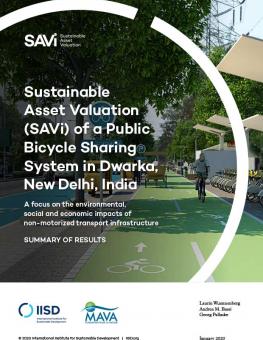
Sustainable Asset Valuation (SAVi) of a Public Bicycle Sharing System in Dwarka, New Delhi, India: A focus on the environmental, social and economic impacts of non-motorized transport infrastructure
This SAVi assessment values the environmental, social and economic benefits generated by a public bicycle sharing system. Its results demonstrate how the transport system delivers to sustainable mobility targets in Delhi.
Key Messages
- The application of the SAVi methodology helps making a stronger case for a planned public bicycle sharing system in Dwarka, Delhi, by estimating and valuing the environmental, social and economic co-benefits and avoided costs it generates.
- The report provides evidence of how the successful implementation of the bicycle sharing system advances the realization of sustainable mobility targets in Dwarka, improves the quality of life and delivers transport policy objectives defined in the Delhi Master Plan 2021.
- Even if conservative demand numbers and low estimates for the valuation of externalities are assumed, discounted net benefits over the course of 20 years amount to more than INR 3.14 billion (~USD 44.4 million) while the most significant benefits stem from the economic value of time saved, avoided costs of air pollution and increases in retail revenues and property values.
This report presents the results of the Sustainable Asset Valuation (SAVi) applied to the planned Public Bicycle Sharing (PBS) system in Dwarka, Delhi. To strengthen the business case for the PBS system and encourage public authorities to invest in providing the baseline bicycle and safety infrastructure, it is vital to estimate and value the co-benefits, avoided costs and additional costs expected from this particular non-motorized transport system.
The SAVi assessment consists of the following elements:
- A calculation of three demand scenarios and associated changes in transport use patterns in Dwarka.
- A valuation of nine externalities resulting from a successfully implemented PBS system.
- A scenario comparison of the valued externalities.
- An integrated cost–benefit analysis of the PBS system, including valued externalities per PBS demand scenario.
The results of a conventional cost-benefit analysis indicate that the PBS system is financially deficient under all demand scenarios. If the environmental, social and economic co-benefits and avoided costs valued by SAVi are taken into account, however, the picture changes. The results of an integrated cost–benefit analysis demonstrate that each demand scenario yields a positive net value. The higher the demand for using the PBS system, the higher the positive net results. The most significant benefits stem from the economic value of time saved, avoided costs of air pollution and increases in retail revenues and property values.
Even if conservative demand numbers and low estimates for the valuation of externalities are assumed, discounted net benefits over a course of 20 years amount to more than INR 3.14 billion (~USD 44.4 million). The more optimistic high-demand scenario would yield INR 12.19 billion (~USD 172.3 million) net results if high valuation estimates for the externalities are assumed. These net results also indicate a benchmark for deciding on the investment volume for additional bicycle and road safety infrastructure in Dwarka.
Altogether, this SAVi assessment provides evidence that the PBS system is a worthwhile investment, as it advances the realization of sustainable mobility targets in Dwarka, improves the quality of life and therefore delivers transport policy objectives defined in the Delhi Master Plan 2021.
Participating experts
Additional downloads
Funded by
You might also be interested in
A Sustainable Asset Valuation of Non-Motorized Transport in Coimbatore, India
A Sustainable Asset Valuation (SAVi) of the economic, social, and environmental benefits of a non-motorized transport (NMT) network in Coimbatore, India.
Factor Gender into Transportation Planning, IISD Analyst Urges Policy-Makers
Cost-benefit decisions on new transportation infrastructure that are gender-blind create a cost for women and the societies they live in, says an analyst with the International Institute for Sustainable Development (IISD).
Uncovering the Value of Sustainable Transport Investments
Using a case study in Coimbatore, India, IISD demonstrates the importance of recognizing, valuing, and reflecting the full economic, social and environmental benefits and costs of a transport project in infrastructure decision-making.
Sustainable Asset Valuation of the Kalivaç and Poçem Hydropower Projects
The SAVi results suggest that the hydropower assets cannot be considered a preferable solution to generate electricity for the Albanian people.